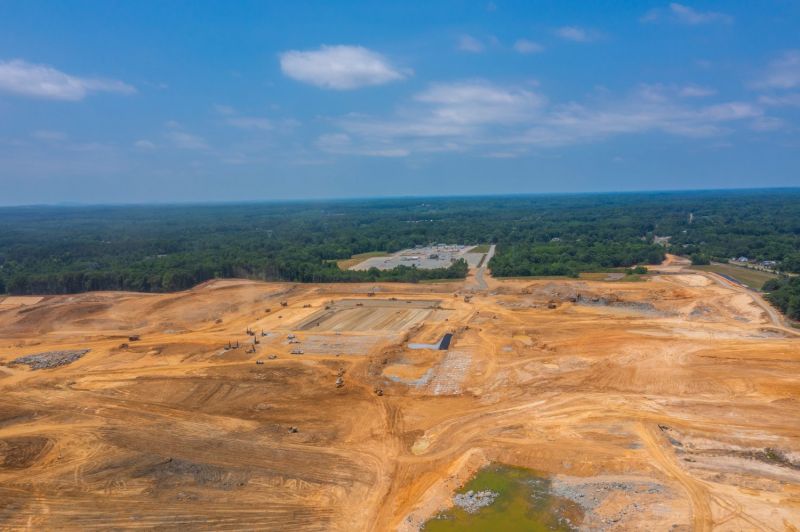Toyota is Investing an Additional $2.5 Billion to Expand its North Carolina Factory to Boost EV Battery Production
【Summary】Toyota Motor Corp announced on Wednesday that it will invest an additional $2.5 billion at its newest U.S. facility, “Toyota Battery Manufacturing North Carolina” (TBMNC), to produce more batteries for electrified vehicles. Battery production is scheduled to begin in 2025. The latest investment brings Toyota’s total investment in North Carolina to $3.8 billion.

The world's automakers continue to make multi-billion dollar investments to produce more electric vehicles, including Toyota Motor Corp. The automaker announced on Wednesday that it will invest an additional $2.5 billion at its newest U.S. facility, "Toyota Battery Manufacturing North Carolina" (TBMNC), to prepare the plant to produce batteries for electric vehicles, which is scheduled to begin in 2025.
The North Carolina facility will also produce batteries for hybrid electric vehicles (HEVs) for Toyota's U.S.-built electrified models. Once fully operational, TBMNC is anticipated to produce battery packs for 1.2 million electrified vehicles per year.
Toyota's latest investment is part of a larger $70 billion in electrification. The automaker also announced a future battery production commitment of up to $5.6 billion, which includes its investment in North Carolina.
Toyota's plant in Liberty, North Carolina opened in 2021 after an initial investment of $1.29 billion for battery production, which created roughly 1,750 new jobs. The latest investment brings Toyota's total investment in North Carolina to $3.8 billion.
"This marks another significant milestone for our company," said Norm Bafunno, senior vice president, Unit Manufacturing and Engineering at Toyota Motor North America. "This plant will serve a central role in Toyota's leadership toward a fully electrified future and will help us meet our goal of carbon neutrality in our vehicles and global operations by 2035."
Toyota's factory in North Carolina contributes to the Southeast U.S. region's emergence as a booming auto production hub. The automaker's investment in North Carolina is one of largest manufacturing investments in the state's history, according to North Carolina's Commerce Department.
In Dec 2021, North Carolina's Economic Investment Committee approved an inventive package worth $438.7 million for Toyota to build and expand the plant.
"This is an exciting time for Toyota, the region and the many North Carolinians we will soon employ," said Sean Suggs, TBMNC president. "This incremental investment reflects our continued commitment to ensuring jobs and future economic growth for the Triad region."
Other overseas automakers with factories in the Southeast U.S. states include Volvo Cars, BMW, Mercedes-Benz, Hyundai, Kia, Honda, Nissan and Mazda.
Toyota is also investing in EV battery recycling efforts in the U.S. as the company transitions to electrification. In June, Toyota announced a collaboration with electric vehicle battery recycling startup Redwood Materials, a company founded by Tesla co-founder J.B. Straubel.
The two companies plan to build an entire closed loop ecosystem in North America for the recycling of batteries from Toyota's future hybrid and fully-electric vehicles. The collaboration will include the collection, testing and recycling of used batteries into raw materials to create a sustainable supply chain.
Toyota and Redwood Materials also aim to develop second-life opportunities for remanufactured and repurposed hybrid electric vehicle batteries by leveraging battery health screening tools and data from its vehicles.
Toyota aims to sell roughly 8 million electrified vehicles a year by 2030, which includes an investment of roughly $70 billion to develop purely-electric, plug-in hybrids, hybrid electric vehicles and fuel cell vehicles. Toyoya is aiming for 2 million of these new vehicles to be fully-electric.
The plans are part of Toyota's long-term strategy of achieving carbon neutrality by 2050.
-


Ford is Testing a New Robotic Charging Station to Assist Drivers of EVs With Disabilities
-


Ford Raises the Prices of the F-150 Lightning Electric Pickup Due to Rising Raw Material Costs
-


The BMW 7-Series to Feature HD Live Maps From HERE Technologies for Hands-Free Highway Driving in North America at Speeds up to 80 MPH
-


AutoX to Use the 'Eyeonic Vision Sensor' from California-based SiLC Technologies for its Robotaxi Fleet in China
-


LG Develops ‘Invisible’ Speaker Sound Technology That Could Revolutionize In-Vehicle Audio
-


Researchers at South Korea’s Chung-Ang University Develop a ‘Meta-Reinforcement’ Machine Learning Algorithm for Traffic Lights to Improve Vehicle Throughput
-


Zeekr’s New 009 Electric Passenger Van is the World’s First EV to Feature CATL’s Advanced ‘Qilin’ Battery With a Range of 510 Miles
-


Redwood Materials is Building an Electric Vehicle Battery Recycling Facility in South Carolina
- US-listed LiDAR Developers Velodyne and Ouster to Merge in an All-Stock Deal
- EV Startup VinFast is Offering 3 Years of Free EV Charging and Advanced Driver Assist System for Customers That Reserve a Vehicle Through Sept 30
- Tesla’s Model 3 is Reportedly Getting a Redesign to Make it More Appealing as Competition in the EV Segment Grows
- Mazda Outlines Plans to Invest $10.6 Billion in Electric and Hybrid Vehicle Development Through 2030
- GM Expanding First Responder Training Program for EV Crashes
- Volkswagen’s Software Company CARIAD to Use BlackBerry QNX to Support ADAS and Autonomous Driving Functions of Future VW Vehicles
- Audi Hits EV Startup NIO With a Trademark Lawsuit Over its Vehicle Naming
- Tesla Shutters its San Mateo, CA Office, Lays Off Roughly 200 Autopilot Staff Without Notice
- Consumer Reports Survey Finds Roughly 28% of Respondents Don't Want to Buy an EV
- Biden Administration Announces New Standards to Make EV Chargers More Accessible











 About Us
About Us Contact Us
Contact Us Careers
Careers